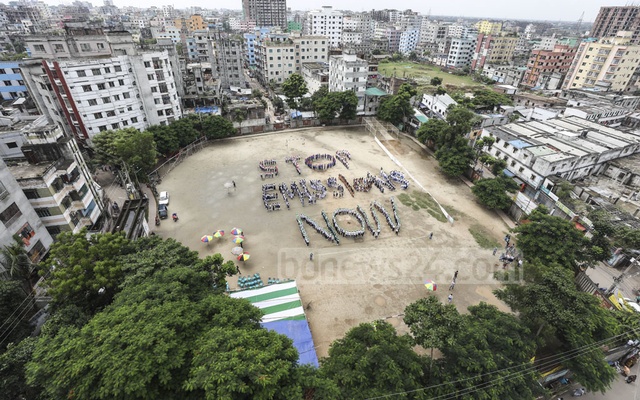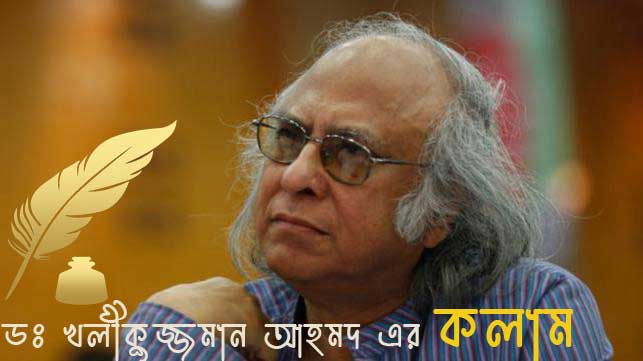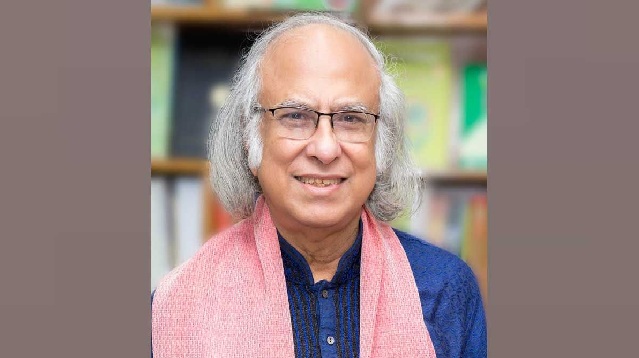(Written by Turaj Ahmad and Syed Mahmud Onindo)
With world leaders acknowledging the ‘existential threat’ of climate change, all eyes now turn to Glasgow, where delegations and representatives of almost 200 countries are converging for the 2021 United Nations climate change conference.
Billed as the last major chance to galvanize the collective effort needed to limit global warming to 1.5 degrees Celsius, the 26th edition of the Conference of the Parties (COP26) will kick off in Scotland’s biggest city on Oct 31. The event will conclude on Nov 12.
While a slew of pledges was announced by nations in the run-up to the two-week event, reluctance among major polluters, including China, India and Australia, to adopt stronger measures to reduce their planet-warming emissions has dented hopes for an ambitious outcome.
As a country that is particularly vulnerable to climate change, Bangladesh recognizes the need to reach a consensus for substantive action to stem global warming and will look to hammer home a five-point agenda at the crucial summit.
The South Asian country will stress the need to prioritize the implementation of pledges of the richest nations to provide financial assistance to countries affected by the phenomenon.
To this end, Bangladesh will present its position on ensuring equal (50:50) allocation of funds for adaptation and mitigation.
Based on past experiences, however, Qazi Kholiquzzaman Ahmad, a prominent economist, maintains reservations about a promising outcome from the conference, despite the high expectations surrounding the event.
bdnews24.com spoke to members of the Bangladesh delegation for COP26 and officials from the Ministry of Environment, Forests and Climate Change about the country’s preparations and goals at the event.
A four-member delegation from Bangladesh has also already started attending the meetings and will be joined by another team from the country. Additional Secretary to the Climate Change Division Mizanul Haque is leading the four-member advanced team.
Prime Minister Sheikh Hasina will attend the conference as the president of the Climate Vulnerable Forum (CVF), a group of 48 countries most at risk from climate impacts. She is scheduled to address the ‘World Leaders Summit’.
She will push for setting up Nationally Determined Contributions, or NDCs, to keep the rate of planetary warming down to 1.5 degrees Celsius, a $100 billion climate fund pledged by the developed nations, and cooperation to increase the use of renewable energy, according to Foreign Minister AK Abdul Momen.
While the diverse interests among the 197 signatories to the UN Framework Convention on Climate Change (UNFCCC) make reaching a consensus a challenge, stakeholders are hoping that the conference will help bridge the gap between the commitments of developed nations and the efforts of developing countries in the fight against climate change.
Developing countries, including Bangladesh, will also reiterate their demands and expectations from the major players in terms of climate action.
The Least Developed Countries (LDCs) group, representing the world’s 46 poorest nations which are least responsible for causing climate change, is set to draw a lot of attention at the conference.
Along with blocs such as the African Group of Negotiators and the Climate Vulnerable Forum, LDCs are expected to push wealthy countries to honour a pledge to provide $100 billion per year in climate finance to the developing world for the 2020-2024 period – a target they are on track to miss.
Mirza Shawkat Ali, a member of the Bangladesh delegation in Glasgow, said the group of LDCs had met on Oct 25-26.
The group’s meeting with the executive secretary of the UNFCCC was also quite fruitful. The African group met on Thursday, while the G77 + China, a longtime alliance of 77 developing countries and China, was set to meet on Friday. This group holds the line on the concept that different countries have differing responsibilities.
The Bangladesh delegation will raise its points as part of both the LDC and G77 + China blocs.
“A country cannot speak alone. After having discussions with them for a year, our position is in line with the LDC position and we will proceed accordingly,” said Sanjay Kumar Bhowmik, a member of the Bangladesh delegation
PRE-SESSIONS AND BANGLADESH PAVILION
Mirza Shawkat, who has already attended the pre-sessional meetings, said various groups are holding preparatory discussions to finalise their positions. The main discussions will start on Oct 31.
“The meetings here have been good. A position paper has been prepared for the entire Bangladesh delegation. All our talking points are detailed in the paper.”
Bangladesh also has its own 100 square metre pavilion at the conference venue. The official said the pavilion would be formally handed over on Friday. There will be 19 side events and the pavilion will display a variety of publications and documentaries ahead of the global climate conference.
PRIORITY AREAS
The landmark 2015 Paris agreement committed signatories to keeping global warming to “well below” 2 degrees above pre-industrial levels and preferably to 1.5 degrees, with the goal of reaching net-zero by 2050.
Since then, as extreme weather episodes have intensified and carbon levels in the atmosphere have grown, climate scientists have increasingly emphasised the importance of a 1.5-degree cap to limit the risk of environmental catastrophe.
Two UN reports warned this week that the world is “way off track” to cap rising temperatures, with current pledges set to result in an average 2.7C temperature increase this century.
Signatories to the Treaty of Paris also pledged to raise $100 billion a year to reduce carbon emissions.
The commitments and pledges made under the Paris Agreement on greenhouse gases will be under the scanner at COP26 and Bangladesh will focus particularly on Article 6, which allows Parties to cooperate in implementing their nationally determined contributions (NDCs) towards emission reduction. It will also emphasise the need for measures geared towards adaptation and financing and the losses and damages caused by climate change.
On the developed countries’ failure to follow through on the pledge to raise $100 billion, Mirza Shawkat said: “We will put emphasis on this at the conference. This is a major decision. I hope this time we will be able to reach a consensus.”
EQUAL FUNDS FOR ADAPTATION, MITIGATION
The members of the delegation said they will propose more funds for adaptation as most of the money is going into mitigation at the moment.
“We want to make sure that half of the money is allocated for adaptation and the other half for mitigation. We will raise these issues strongly. We’ve already discussed it in an LDC meeting on Oct 25-26. We have to settle our LDC status first and speak through it.”
Steam rises at sunrise from the Lethabo Power Station, a coal-fired power station owned by state power utility Eskom near Sasolburg, South Africa, March 2, 2016. Reuters
Steam rises at sunrise from the Lethabo Power Station, a coal-fired power station owned by state power utility Eskom near Sasolburg, South Africa, March 2, 2016. Reuters
Equal attention is being given to how the money will be spent.
Mirza Shawkat said, “It could happen through bilateral mechanisms or green technology. A lot of money will come through the Green Climate, LDC and adaptation funds
“We are planning to [manage the expenditure] through a registry to identify where the money is being spent and ensure that it is actually going into climate change issues. So that we can understand that the money is going to development and being spent under monitoring and mechanisms.
LASTING STRUCTURE FOR LOSSES AND DAMAGE
With no funds for losses and damage either, there are worries over its missing structure. “There will be funds for planning adaptation, identifying and carrying out the necessary operations. But we have no money for loss and damage,” Mirza Shawkat said.
“Our target this time is to come up with a permanent structure for loss and damage while arranging some funds for the area. We held talks over it in COP 25, so that the structure is concrete and the allocation specific,” he said.
“We are hoping to finalise how the Santiago Network for Loss and Damage will work in this COP.”
5-YEARLY NDC UPDATES NEEDED
Another delegation is set to travel to Glasgow to attend the climate talks from Bangladesh.
Sanjay Bhowmik, a member of the team and additional secretary to the environment ministry, said that climate discussion is a global agenda and the solutions that come with it will be crucial for everyone, not just Bangladesh.
“It carries more significance for us as we are most at risk from climate change. Our prime minister is the president of CVF [Climate Vulnerable Forum] this time around. She will deliver her statement for the 48-country forum, for Bangladesh and play a prominent role on behalf of the CVF.”
Birds fly next to electricity pylons on a smoggy afternoon in the old quarters of Delhi, India, October 30, 2019. Reuters
Birds fly next to electricity pylons on a smoggy afternoon in the old quarters of Delhi, India, October 30, 2019. Reuters
The climate experts, as they did in the past, have been meeting regularly to negotiate on different issues.
Bhowmik said the issue under the spotlight in the climate talks would be Article 6, involving the carbon trading mechanism, which was shelved during the Paris Agreement.
“Hopefully it will be settled this time. Once it is resolved, we can proceed towards making the Paris Agreement a reality. We’ve not been able to do so until now as the rulebook hasn’t been finalised. It is an important issue for us and the world at the moment.”
As per the latest IPCC report, carbon emission needs to be cut down at a higher rate than the present pace, otherwise, the world will face a fresh crisis, Bhowmik said.
“The report warned the global leaders. The developed countries emit carbon at a higher rate. Bangladesh is very insignificant in this case,” he said.
“Besides LDC, our statements will include a demand to update the Nationally Determined Contribution or NDC every five years. Many countries want the update to occur every decade.”
“The sea level is rising and bringing us losses. If it is done every five years, we’ll be able to tell the world leaders to provide aid swiftly, or else the countries facing the most risk will suffer further losses. We will make a strong statement on this.”
“SWIFT FUNDS WILL BE DEMANDED”
Qazi Kholiquzzaman Ahmad, chairman of Palli Karma-Sahayak Foundation, said: “We will speak about our issues at the conference. We will raise issues including losses, displaced people, erosion, coastal salinity, frequent storms, damage to production. These are occurring more due to climate change; we will ask for funds.”
Calling out the authorities for stepping away from commitment, he said Bangladesh was supposed to receive $100 billion from 2020 onwards. “They make a promise, but don’t commit to it. They promised funds, but did not give it.”
People take part in a Climate March in Brussels, Belgium, ahead of the COP26 climate summit in Glasgow, October 10, 2021. REUTERS
People take part in a Climate March in Brussels, Belgium, ahead of the COP26 climate summit in Glasgow, October 10, 2021. REUTERS
“But Bangladesh spent a lot on their own. We will ask for funds as a group. A country does not get money directly, it is delivered to global groups. The outcome will be good if there are skills in the area and the ability to carry out projects; it’s a very long and drawn-out process.
“We will ask for swift donations. We have to clarify our position as a country in losses. They will pool the money there, and it is a difficult task to bring it from there.”
[Written in English by Turaj Ahmad and Syed Mahmud Onindo]
Article links:
- “COP26: Bangladesh to call out rich nations for failure to provide $100bn climate fund” news published on 31 Oct 2021 by BDNews24.COM.
https://bdnews24.com/environment/2021/10/31/cop26-bangladesh-to-call-out-rich-nations-for-failure-to-provide-100bn-climate-fund


